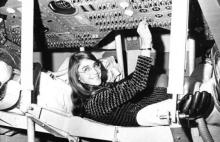History Matters. Historicizing The Partisan.
Today, it feels like more people are talking about politics and the economy than ever before. In many ways, however, these topics have also become much harder to discuss. They quite rightly invoke strong emotions, but this can often lead to a polarization that can cloud understanding and get in the way of healthy discussion and progress.
This spring, students will have the opportunity to get beyond the divide by being asked to reflect historically on the political and economic discourses, theories, and trends, that have brought us to the present moment. Professor Margaret O’Mara, who is teaching HSTAA 345, explains that although the course goes up to the present day, “this is not a current events class but a chance to think historically about the recent past.” This is why she is so excited to teach it. She continues, "A course like this one is a very powerful way to show students how history matters, because historicizing concepts, structures, and ideas that continue to shape our world, can help students to better navigate their present.”
“This Is Not a Current Events Class But a Chance To Think Historically About The Recent Past... a Course Like This One Is a Very Powerful Way To Show Students How History Matters Because Historicizing Concepts, Structures, and Ideas That Continue to Shape Our World May Help Students To Better Navigate the Present.”
This is especially useful for such potentially contentious topics as politics and economics. Understanding the history of terms such as Republican, Democrat, Neo-Liberalism, Socialism, or Capitalism, and how they came to be weighted with their present meanings, can help to take away the hyperbolic and hyper-partisanship that often accompanies them in the present. O' Mara explains, “it may sound cliché, but knowledge really is power and unpacking these terms as historical objects enables us to apply them in a more measured and critical way, which in turn can help us to understand and even emphasize with those who may hold a different political viewpoint to our own.”
"It May Sound Cliché But Knowledge Really Is Power."
Over the course of ten weeks students will be equipped to frame the current political and economic moment in historical perspective. This perspecitive may also help pave the way towards solutions to issues that can at times feel scary and overwhelming - especially in a moment, such as ours, that often feels unprecedented. The history classroom is one of the only places where these critical skills can be learnt and is therefore a major reason why courses like this one are both so exciting and so important.
Going Deeper.
Another goal of the class is to give students the opportunity to engage in a more in-depth study of Modern American History. Professor O’Mara explains how many students come to college, and into her classrooms, with a wide ranging, but mainly surface understanding, of the recent past. HSTAA 345 is designed to go beyond the traditional American History survey course to allow students to go deeper into the history of the nation’s major economic and political moments. The course takes a case study approach and each lecture will look intensively at one specific moment - such as the Monica Lewinsky Scandal during Bill Clinton’s second term - as a way to understand the larger currents of an era. Events to be covered include the historical role of the presidency, the rise and development of the major two parties, the rise of technology and its impact on society, and the effects of increased globalization on national and world economies. Moreoever, this is not your classic lecture course. O’Mara says that her idea is to “flip the lecture inside the lecture hall” by having students closely analyze primary documents each week. This attention to detail and focus on primary sources are the major reasons why this course has changed from a two hundred (HSTAA 235) to a three hundred level class (HSTAA 345).
Connected Histories.
Students will also learn how the history of poltics and economics are fundamentally connected. O’Mara explains that “part of America's uniqueness lies in the connection beetween the national governent and the private sector… it is therefore necessary to look at politics and economics together as you can’t really understand one without the other... I hope that by the end of the quarter students will have a clear sense of how the market and policy making work together."
"I Hope That By The End of The Quarter Students Will Have a Clear Sense of How The Market and Policy Making Work Together."
HSTAA 345 is being offered in Spring Quarter 2018 and registration is now open.
Knowledge is power and political knowledge can be an extremly powerful tool. Don’t miss this great oppurtunity to learn about, and from, the past!
